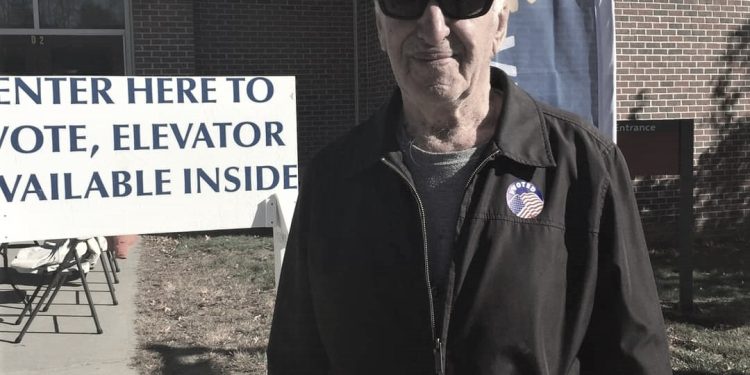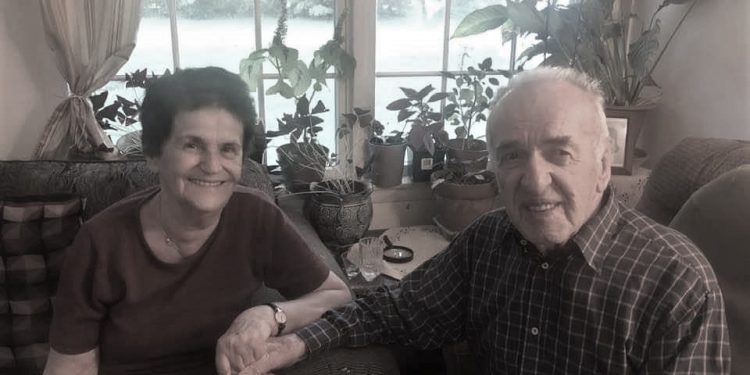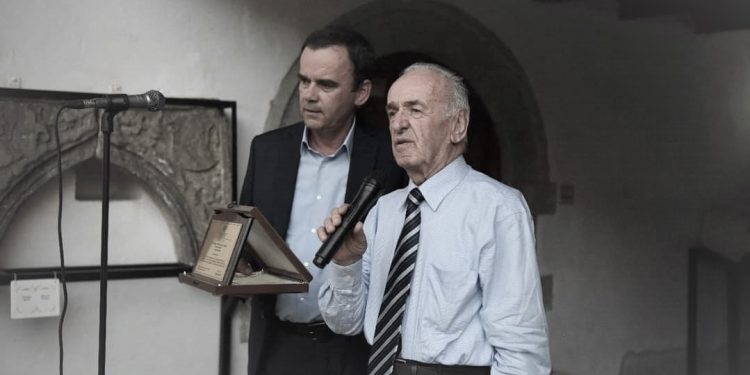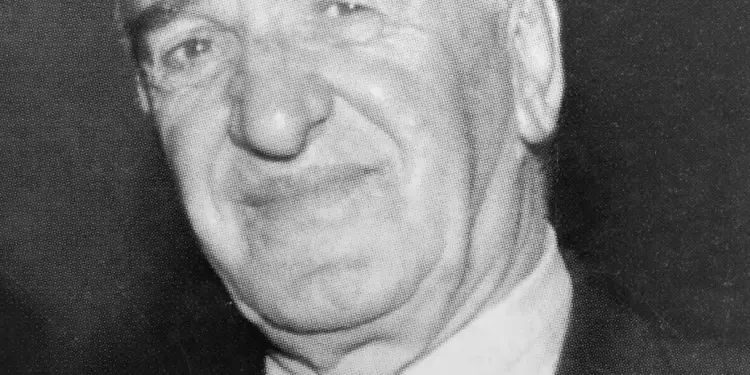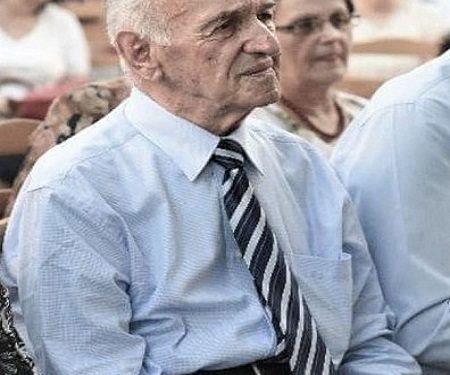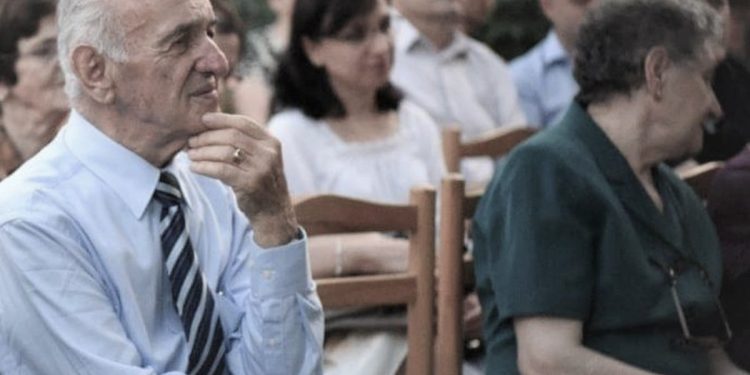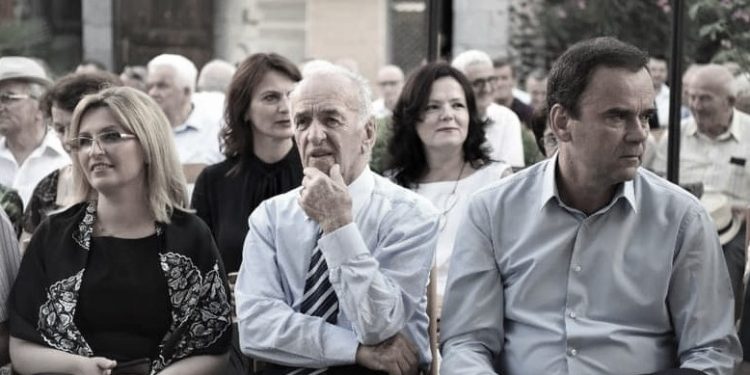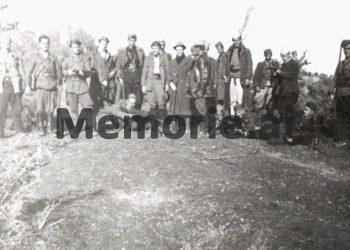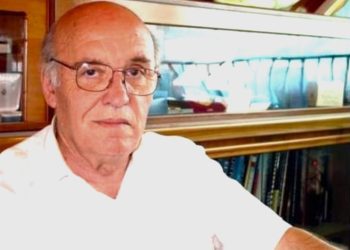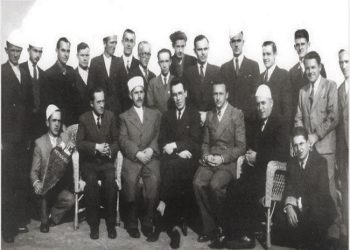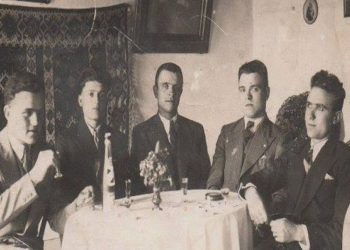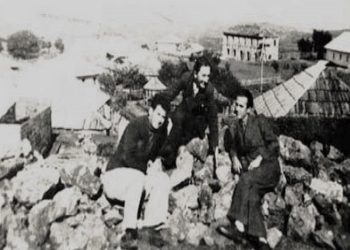By Ahmet Bushati
Second part
Memorie.al / Ahmet Bushati were born in Shkodër in 1929, in one of the well-known families of the large tribe of Bushatllinj, and he is among the first to join the Anti-Communist Movement of Shkodra Students, in the first years after the end of the War. He was arrested and sentenced in 1948 and served a total of 7 years in prison. After leaving prison, he works as a worker and later a forest technician in the district of Kruja. He completed the Faculty of Philology by correspondence in the Language-Literature branch and studied foreign languages, such as: Italian, French and English. In 1991, he returned to Shkodra, where from 1992 to 1996, he served as the chairman of the Shkodra District Municipal Council. He is also one of the personalities of the Association of Former Persecuted and Political Prisoners of Shkodra. He has occasionally published articles in the daily press, as well as memoirs, mainly about the crimes of Enver Hoxha’s communist regime, as well as his sufferings in camps and prisons.
The memories of Ahmet Bushati
Three months between life and death
Continues from last issue
Ragip Lohja, the younger brother of Hysen Lohja, was also in this prison room, he was also imprisoned, but since that time, he was in a labor camp. Ragip had once represented Albania in Paris in the 100 meter sprint athletics competition.
Shaqir Omari was also in that room, and it was said that he was very generous, and that he liked talking to everyone, regardless of age. Since he had spent his life in the mountains, a special pleasure for that man, they had to find the mountain people mainly. In a room with us there were also some old postribas, among whom Isuf Hasani, from Ura e Strenjte, who was short and healthy in body, brave and loyal to the trials, as well as connected to some of the first houses in Shkodër.
One of those postribas, who would like to be teased with Isuf Hasan, would be the other old man, Çel Murati, who, at the head of them, had occupied one corner of the room. Çela, who was thin and tall in body and was small, friendly, and humorous, with Isuf Hasan, would find the opportunity, without hiding it from others, to remind him of stories from their long-ago youth, something for which Isuf Hasani was even more ready than Çela. There was also Myrto Dani, the Bajraktari of Drishti, a real father and loved him like no other man, who, as long as he talked to someone, would stand by him, mouth agape.
There was also Abdullah Sahiti, the son of the Bajraktar of Rasek, Sahit Duli, the hero of the “Postriba Uprising”, generous and restrained, who kept and helped a Kosovar from the highlands of Gjakova, named Xhem Sadria, a brave true, as those who had known him before would tell. There was also Nuz Halili, Dervish Nuzi, and some others, post-tribas, while Hajdar Tafa, Muho Fetahu, Emin Zyberi, Selim Raci, Shaban Hyseni, etc., should have been among the other rooms of the prison, not to mention others post-tribas who at that time were in the Camp of Orman Pojani. Somewhere along with them was Abdulla Salihi, from Puka.
…Good or not, but a special guy with that prison room, would be a certain Gjush Pistulli, who never stopped talking, (except when he was sleeping) and that in his heart, fascism, even why are they out of fashion and despised by all, you had left an unquenchable hearth of fire. Gesticulating with his hands, and putting out his big paws, Gjushi would approach us, the young people, in a friendly way, and like one of the palkas, he would call several times in his voice: “Come, come, come, voi giovani”! Or sometimes, he would address us, waving his finger up and calling us enthusiastically: “Gioventu, gioventu”! There were times when he would even recite verses from the anthem of the fascist youth, even though I had told him several times: “Grandpa, fascism everywhere in the world has ended once and for all and, after we have fought it, even more first, and if the need arises, we will fight again”. Didn’t Gjush hear these words of mine?! Not at all! When he liked, he pretended not to hear them, and in order not to spoil the fun, they left the path open, he left laughing.
…One day, there in the room, they brought two prisoners who were our age, and made room for them at the entrance of the room. We found out that they were from Mirdita. Among the first, we went to meet them. One of them was called Ndue Fusha, who had the appearance of a lord, a noble and attractive appearance, though pale, like the galloping tubercle that he was. His restrained and courageous attitude spoke of a boy with good qualities, from a famous house in Mirdita. The other one was just as good, his friend, like a brother, Gjon Marka Ndoj, with a very open and communicative nature. How very resourceful the bond he was with Ndoja, he never separated you, day or night. She was not only a brother, but also like a sister, according to his need.
When Ndoj was 16 years old, in 1945, he spent a year in prison. In the case of the murder of Bardhok Biba, they arrested him again and sentenced him to death; he was saved from being shot with the intervention of Bardhok Biba’s father. It would not take much time, I think, for the pain of ours, a large prison in Shkodra, he would die in room no. 3. Of patients with tuberculosis.
They had a report on me, why I had broken the regulation, and one day for this, they took me up to the Director, to Shaban Haxhija. Another time, for the same “fault”, as the repeated case that had been, they changed my room, taking me to the one with no. 2., which, even though it was two feet tall and covered with boards, had more air and light than the one with no. 3., after all, my mind would remain on the latter, as we learned that I had been with her and her people.
In this room with no. 2., as my friend, I would find Ernest Përdoda, who since then, smoked a lot, and in order to light it, he lit it before the sun fell on the earth, and of course, without putting anything in his mouth, even though his face since then, it was green.
However, after a few days, in this room, I made some good friends, above all, Hilmi Kamate, with whom I became strongly and forever connected. They put me in the middle of Bajram Xhemali, (with a hole in his face), who was from Doda Castle, who until a few years ago, had studied at the Madrasa in Tirana, and who also knew a little English. Preng Biba, from Mirdita, became a friend of mine, a rather misanthropic man, but also very serious and talented in the production of miniature artistic objects, extracted from peach cores, and celluloid. Once, as per my suggestion, from black celluloid, he took me out with great finesse, an Albanian, with raised arms, ready to fly, while, with his beak, he was trying to break the chains that bound her legs. As a reminder, I sent the Albanian with all the symbolism it had, to Simes.
For about two months that I stayed in this room, with Bajram and Prenga, we would eat together.
In the summer of 1951, when I was in a labor camp there towards Beijing, Preka together with Prelë Toma from Nikçi of Malësi e Madhe, and with another friend of theirs from Dukagjini, escaped from the big prison and went to Yugoslavia. After a relatively long stay, in the infamous camps of Yugoslavia, they were forever separated from their friends and Preka ended up in America, where they were recruited later, by the American military forces of “Rapid Intervention”, one day he died in the Vietnam wars.
I was not finding peace in myself, until I had discovered the person who had reported me about movement from the room, who could one day report others, and about something even more important. For this purpose, one day I decided to go to room no. 3, where I had been before and stayed there, with a friend of mine, Tomë Sheldina. While we were talking with Toma, I was constantly watching every movement that happened in the room. I was waiting for that person to move, who had reported me to the directorate two weeks ago, and of course, I didn’t know who he was.
The moment for that person to move came and I saw when he, believing that Toma and I were out of our minds, at one of his movements – he twisted, towards the door of the room and slipped out like a thief. In order not to be understood by others, he quickly returned to the room and sat like an “angel”, in his place next to the door. Toma told me to leave, since the goal was achieved, but I didn’t think it was enough, as long as the policeman didn’t come there, to prove to everyone that a prisoner was spying, which only then it would give me a chance to unmask him in front of the room. The policeman, on his part, did not deliberately let them pass by for a while, entered the room and when he allegedly suddenly saw me, he turned towards me, looking at me as if wondering: “What about you here? Come with me”! He took me to the director of the prison, who would inform me of the sentence of three days in prison.
…For us young people, who for the first time were in an environment of people of different age, education and other interests, we would be impressed by their general behavior, the respect and kind attitude they had for each other, feelings their collective and a nobility that perhaps from the suffering was manifested by the majority there. With each other, several times we would have as the object of our conversations, the fact that the people there were so good, which we did not have days before.
In this small prison room with no. 2, I found old men who were respected by everyone, like gentlemen: Sheuqet Muka, Shyqyri beg Kopliku and others, with less age. Xhël Baci was also in this room, who at that time was reading “Chefs d’Oeuvres” from French literature, and when she liked one of those chosen novels, she wanted to read them to others. Xhela was talented in literature, although he had an excellent result in Agronomy at Fultz’s school.
In that room was also the disillusioned ex-revolutionary and communist Gjeto Keqi, who would never abandon his mountain humor, who also read in French there and who, as we have shown, continued with his manifesto and a poetic dell. He declared his friendship with me since the “neighborhood” of the dungeons we had in Sigurim, when, for every objection I made to the investigators, as a sign of solidarity with me, he would knock me back against the wall with his fist several times.
Pretash Nika would be in charge of that room.
I had become friends with Todi Ruhu, who was a gentle and honest man, and who, among other things, would tell me how after the liberation, when he had held a meeting of elected officers in Tirana, among whom he that on that occasion he had asked: “Now that we are so connected with Yugoslavia, what will be done with Kosovo”? And Enver Hoxha, who was not formally leading that meeting, answered: “Anyone who wants the good of Kosovo must wish that Kosovo remains with Yugoslavia, for the best conditions that it will have for the construction of socialism in its country”.
In this room I made friends with three young people who, if I’m not mistaken, had once been students of the Shkodra high school and the boarding house of “Malet Tona”, whose names were: Kolë Skana, Preng Bajraktari and Ndue Zefi Ndoci. Ali Taipi, from the “Dudas” neighborhood, happens to be imprisoned for harboring a ballistic friend of his, from the south, Major Bilbil Hajdini. Ali was a good man and very willing, and despite his rather old age, I would always see him smiling and in a good mood.
Kolë Ndou, the leader of Shala, was a calm and wise man. Without being at all artificial, it would seem quite imposing, standing in its place with the prestige of a man who, even in adversity, seeks to preserve and justify the importance of a mountain range. Kolë Ndou, with a pair of large mustaches that stretched straight to the sides, never moved from his place, and two middle-aged men from Dukagjin, one of whom was tall and named Nikë, would constantly be by his side, as a sign of great respect, they will ask for everything, without letting them touch anything with their hands.
Kolë Ndoun, all the time you would see him sitting cross-legged, with his body held straight and his pipe lit. If you went to “visit” him, he enjoyed himself so much and respected you so much that when you left him, you would feel that you had taken with you the pleasure of a warm conversation. Ndue Lala from Mirdite had gone through a life of ours with suffering and vicissitudes. He was a gentle and humane man, and he also had a clear and flowing way of telling stories, so the events in his mouth took on a special beauty and aroused so much curiosity and interest in me that I spent time with him, it constantly gave me pleasure.
I think at that time, he must have been about fifty year’s old man. It had a pale pink face with brown spots stamped across it. In the case of Bardhok Biba’s murder, he was arrested and sentenced to death, and for three months he remained under the heavy weight of that punishment.
An extreme poverty and a concept derived from it, had taken him and his friends once, to rob cattle with the force of rifles, even to the distant villages of Kosovo and Chameria, in order to enable the survival of children, women, elders who were in the house. With such a motive they would justify every robbery, they would feel proud of the courage shown in these cases, and the more distant the place of their action, the more honor they would bring among their countries, when they returned, and those who fell in the effort and with weapons during those occasions, they were remembered as those who fell during the wars for the homeland.
In room no. 1 where I had sneaked in two or three times, the most interesting and honorable figure, including the other two rooms, would without a doubt be that of Sheh Ali Bogdani from the Bicaj of the River. Personally, I never had the opportunity to meet him. I saw him with that modest – but very well-proportioned body – wrapped in a long brown robe, wearing one of those low fez, usually used by the Muslim faithful at prayer times, plus a soft beard like silk and white as snow, which gracefully descended down to his chest, and above all a grace that shone as if by mystery, in a beautiful face with noble features, making you say that he was himself ” Muhammad” descended to earth.
As the prisoners who were in a room with him would tell us, he spent all his time in deep meditation and prayer, directed to God. The religious culture and especially the devotion to God, which together with his human wisdom and prestige, made him, as we said above, the most respected man.
His chosen one or his favorite without any rival would be Elez Troshani, for the religious vocation he had, as well as for the adoration – as for a saint – that he had for Sheh Ali. Elezi, accompanied by a policeman, would work as a pharmacist outside the prison all day and when we returned to the prison in the afternoon until just before he fell asleep, he would spend all that time sitting on his knees alone on his knees, in front of Alicia, as in front of God.
Seeh Ali had completed his religious studies in Istanbul. Two boys from Shishtaveci with the last name Ndreguti, one of them with the name Ragip, would constantly stand by Sheh Ali and serve him with everything.
In room no. 1 we had friends Ruzhdi Çoba, as well as students: Thabit Rusi, Rrok Pali, Refik Bushati, Gjon Ljarja, Lec Bruçaj, etc., in that room also the prestigious old man Ramadan Aga, Dan Hasani, as always proud and authoritative and enjoying good health good, despite his approaching eighties. There and Mr. Zef Haxhia, as well as Riza Hoti, the father of my friend, Burhan Hoti, in whose benevolent smile I would constantly seem to read not only my relationship with his son, but also his gratitude as a parent , for the reason that I had not taken his son out, during the investigation in Security. There was also the brave and respected Hodja, Hafiz Musa Dërguti, my cousin Ruzhdi Baja, Rasim Hebovija, Qemal Dibra, dentist Xhabit Dibra, Gani Ymeri, Paulin Kel Pali, as well as the elderly, tuberculosis, brave and loyal, our friend then and then, Mark Lleshi.
The priests were on their own. We saw them very little, only when we went to the toilet. Among them, those who were sick or completely incapable of physical work, as well as anyone who, in order to justify staying within the small group of workers, could do a specialized job for the benefit of the directorate, were left without going to the camp. Among the priests, one such could be Father Leon Kabashi, with whom he managed to communicate in a way that was incomprehensible to others, only Ramadan Sokoli, of course, he was interested in the paintings that he probably had in hand. As far as I remember, there were also: Monsignor Koliqi, Father Frano Kiri, Father Mark Harapi, Father Gegë Lumaj, and even Father Rrok Gurashi, the priest with whom the communist government, through Tuk Jakova, continued – as they said – without resistance , treaties for the separation of the Church from the Vatican.
Just like the priests, somewhere on the side of that building, there was also the women’s room, where Lady Adile Boletini, as well as the younger ones: Drita Kosturi, Agime Pipa, Terezina Pali, Vitore Kuka, Ana Daja, Bedrije Ashiku, a nun with the name of Prenda, so that you were imprisoned as a citizen, our comrades of the day called “Prenda the beautiful”, because she was really very beautiful, who with the people of the mountain, had shown herself to be very brave and loyal. It would hurt us when, after a year, we heard that she had died in prison from tuberculosis. Memorie.al




